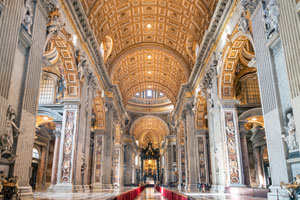
One thing that characterizes the coming Synod of Synodality is its emphasis on listening to other voices. All voices.
Catholics are told that “the spirit” speaks through all who are marginalized and excluded. Thus, listening to the widest variety of voices is necessary. In becoming a listening church, the “people of God” can “walk together” on the synodal path to a new evangelization.
Synod organizers insist upon what they call “radical inclusion.” No one is excluded. “Everyone, everyone, everyone” is how, in Lisbon, Pope Francis expressed his desire to see the Church expand the space in her tent.
Everyone means every single person. Synod documents declare the need to listen to those who don’t agree with the Church, like atheists, those who have left the faith or people of other religions. It also includes those who do not live according to Catholic morality, like “remarried” divorcees, LGBTQ individuals in same-sex unions and those cohabitating. Everyone.
Thus, radical inclusion must embrace all. The minute someone is excluded, the process is broken. When people stop listening, the spirit cannot act. The Synod is all about welcoming, and any rejection, especially by Church officials, signals a failure in being a synodal church.
This internal logic of the Synod on Synodality is echoed, emphasized and repeated in documents and listening sessions. Everyone must be included.
Help Remove Jesus Bath Mat on Amazon
Everyone that is, except concerned Catholics like me.
I confess that I am concerned that this synodal process might be a Pandora’s Box that could lead to confusion, error and division. I am not alone. A growing number of cardinals, bishops, priests and laity share my concerns. Despite these misgivings, I would expect that, in fairness, these Catholics should be treated at least like the many others who have been included. I would hope that Synod promoters would listen and give some value to the voice of tradition. That is what synodality is all about.
However, those expressing their concerns are met with exclusion. Their views are rejected with a vehemence that I can only qualify as radical exclusion. When bringing up these issues in public, there is an almost rabid refusal even to consider the traditional perspective. Tradition is judged and hanged without a hearing…or any listening.
These excluded Catholics are not presented with a listening process but a labeling one.
Satanic Christ Porn-blasphemy at Walmart — Sign Petition
We are dismissed with the label of being backward or even “backwardist.” We are told that the Synod process must always go forward and never go back. Nevertheless, while backwardness is used as an epithet for Synod critics, the concept is used favorably by Fr. James Martin, S.J., one of the Synod’s 364 voting members. He claims the Synod is a return to “a form of ecclesial gathering that has existed since the time of the early church, but which fell into disuse.” Catholics are thus told simultaneously to go back and never to go back. Evidently, there are some undisclosed criteria as to which backward practices are acceptable and which are not.
Another label being thrown around is that of an ill-defined “ideology.” Anyone who holds a set of certainties and doctrines can be dubbed ideological. However, those voicing their concerns hold nothing different from what the Church has always professed. To quote Saint Vincent of Lerins, faithful Catholics uphold what has “always been believed everywhere and by all” (quod semper, quod ubique, quod ab omnibus). For the “ideology” label to correctly apply to these faithful Catholics, their detractors must first show that they are introducing something new that was never taught before. However, the introduction of novel doctrines and changes to morals are not being proposed by faithful Catholics but by Synod promoters.
The main reason for this radical exclusion is to eliminate any opposition inside or outside the Synod. The furious attacks upon those with concerns can be reduced to silencing all who disagree. Thus, listening is limited to those who agree with the general Synod program.
For Synod promoters, the spirit speaks through those outside the Church and fallen from grace, but it does not speak through those opposed to the proposed novelties. Whoever disagrees must be radically excluded lest it ruin the proceedings. As journalist Michael Sean Winters concludes in his recent column in the National Catholic Reporter, Synod critics “are not to be listened to, but to be pitied.”
How Panera’s Socialist Bread Ruined Company
This Synod anti-listening policy should be loudly denounced. Synod promoters are disingenuous. They claim that theirs is a policy of radical inclusion, but their talk does not match their radically excluding actions.
It is hard to claim that the spirit will spontaneously determine the agenda of the Synod when, by excluding the voice of faithful Catholics beforehand, Synod organizers and their specially-trained facilitators will determine what will be allowed in the closed-door discussion sessions and final synodal documents. An assembly that claims to promote dialogue but where everyone must agree with the party line is not a forum for free discussion but a cause for legitimate concern.
While many hot-button moral issues will be discussed at the event, this radically exclusive synodal process will be the main focus. That is why concerned Catholics must make their voices heard. Making this novel process part of how the Church is governed must be protested as contrary to the divine ordained hierarchy established by Our Lord Jesus Christ.
Photo Credit: © Giorgio G – stock.adobe.com


